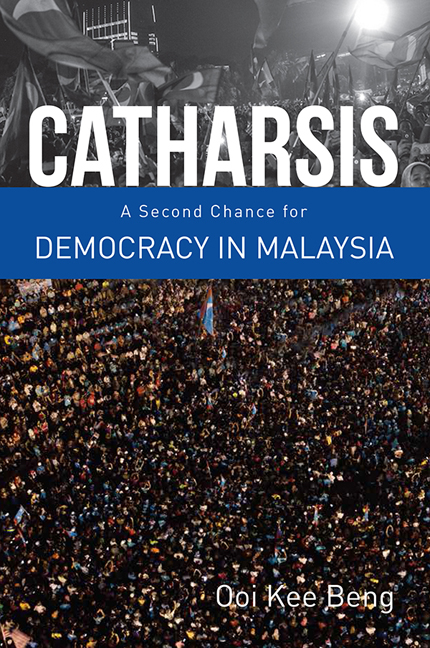Book contents
- Frontmatter
- Contents
- Foreword
- 1 Introduction – Malaysia's Future Is Redeemed
- Before Pakatan Harapan
- Before 9 May 2018
- 12 Racialising the Un-racialisable: What Is the Red Shirt Rally All About?
- 13 One Country's Merdeka Is Another's Damage Control
- 14 Malaysia – Where Politics Must Be Ethnically Inclusive and Exclusive at the Same Time
- 15 Is Malaysia at a Crossroads or in a Quagmire?
- 16 Unity Without Solidarity Sows Disunity
- 17 UMNO and Looking Back at History
- 18 Sarawak Forces Federal Opposition to Do Deep Soul-searching. But Can It?
- 19 By-elections Reveal New Malay Politics
- 20 Interview with Mahathir Mohamad: ‘People Must Be Able to Hold Their Heads Up.’
- 21 Malaysia Has to Start Re-examining Its Histories
- 22 Waves from US Probe into 1MDB May Turn into Tsunami
- 23 Seeking a New Formula to Unite Malaysia's Diversity
- 24 Time for Anwar to Accept Mahathir's Olive Branch?
- 25 Najib, Mahathir and the Timing of Malaysia's Polls
- 26 Excessive Governance Is Not Good Governance
- 27 Why Malaysia's Opposition Will Take to the Streets Again
- 28 Merdeka is About The Individual, Too
- 29 A Battle Between Malay Leaders Over Malaysia's Future
- 30 The Primacy of Political Economy in Asia
- With Mahathir at the Helm
- Beyond 9 May 2018
- About the Author
16 - Unity Without Solidarity Sows Disunity
from Before 9 May 2018
Published online by Cambridge University Press: 12 February 2019
- Frontmatter
- Contents
- Foreword
- 1 Introduction – Malaysia's Future Is Redeemed
- Before Pakatan Harapan
- Before 9 May 2018
- 12 Racialising the Un-racialisable: What Is the Red Shirt Rally All About?
- 13 One Country's Merdeka Is Another's Damage Control
- 14 Malaysia – Where Politics Must Be Ethnically Inclusive and Exclusive at the Same Time
- 15 Is Malaysia at a Crossroads or in a Quagmire?
- 16 Unity Without Solidarity Sows Disunity
- 17 UMNO and Looking Back at History
- 18 Sarawak Forces Federal Opposition to Do Deep Soul-searching. But Can It?
- 19 By-elections Reveal New Malay Politics
- 20 Interview with Mahathir Mohamad: ‘People Must Be Able to Hold Their Heads Up.’
- 21 Malaysia Has to Start Re-examining Its Histories
- 22 Waves from US Probe into 1MDB May Turn into Tsunami
- 23 Seeking a New Formula to Unite Malaysia's Diversity
- 24 Time for Anwar to Accept Mahathir's Olive Branch?
- 25 Najib, Mahathir and the Timing of Malaysia's Polls
- 26 Excessive Governance Is Not Good Governance
- 27 Why Malaysia's Opposition Will Take to the Streets Again
- 28 Merdeka is About The Individual, Too
- 29 A Battle Between Malay Leaders Over Malaysia's Future
- 30 The Primacy of Political Economy in Asia
- With Mahathir at the Helm
- Beyond 9 May 2018
- About the Author
Summary
The biggest parade in Malaysian political narrative is how the call for unity is in reality a call for disunity. This comes about because calls for unity tend to be rhetorical appeals for racial unity vis-à-vis other races.
Since all societies today, and Malaysia started out already that way, are multi-cultural in reality, racial unity means inter-racial disunity. Such a paradigm cannot help but incessantly provoke confrontation and distrust. No common long-term goals can be sustained. Worse than that, any serious discussion becomes potentially a polarising one, be it over type of education, form of worship, style of dressing, food for eating, treatment of women, etc.
As the distrust grows, the calls for unity take on a religious character – religion being the major historical determinant of race. We see this happen more and more the worse the country's economic conditions become. This is nothing new, nothing surprising.
We saw how desperate times in Germany in the 1930s led to the rise of a radically racist regime and the momentum of that change quickly led to the destruction of traditional German society. With the fall of Adolf Hitler's Third Reich in 1945, it became politically inexcusable in the West to use ‘race’ as the rationale for formulating policies. In academia, we saw the dropping of the term ‘race’ from practically all discussions, in favour of ‘ethnicity’ as the apparently more neutral and therefore more scientifically acceptable concept.
Racialism became a rhetorical taboo globally. This did not in any way mean that racism was history. Far from it. It just meant that policy arguments based on race had very little traction after the Second World War. There were still some attempts to plant racialism as the rationale for state building. One was the generally unrecognised Republic of Rhodesia, which in 1978 had to transform itself into multicultural Zimbabwe. Another more significant case was South Africa's apartheid regime, which lasted too long – from 1948 to 1994.
In the USA, where the suppression of black Americans had continued despite the ending of slavery in 1865, the civil rights movement managed in the 1960s to reduce substantially racial bias in administrative practices.
- Type
- Chapter
- Information
- CatharsisA Second Chance for Democracy in Malaysia, pp. 55 - 57Publisher: ISEAS–Yusof Ishak InstitutePrint publication year: 2018

